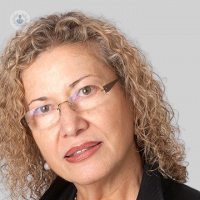Bone unfriendly drugs – which drugs can cause osteoporosis?
Written by:Some patients on certain types of medication are at a higher risk of developing osteoporosis, with the medication having negative effects on bone health. The risk is especially higher in recently menopausal women (within four years of menopause), those who previously had low bone density or have already experienced fragility fracture, those who have a family history of osteoporosis, smokers, patients who have excessive alcohol intake, and those who are vitamin D deficient. Leading consultant endocrinologist, Professor Gordana Prelevic explains which kinds of medication pose a risk to bone health.

Which medications are a risk to bone health?
The following drugs are known to decrease bone health while the patient is on a course of medication:
- Corticosteroids are used for the treatment of asthma, arthritis, systemic lupus, multiple sclerosis and numerous other conditions
- Phenobarbital and phenytoin are used to treat epilepsy
- Aromatase inhibitors (anastrazol, letrozol) are used to treat breast cancer
- GnRH agonists (goserelin, buserelin, triptorelin) are used for treatment of endometriosis, prostate cancer and in IVF
- Proton pump inhibitors (omeprazole, lansoprazole, esomeprazole) are used for treatment of gastro-esophageal reflux, heartburn, peptic ulcer
- Heparin is used for prevention of blood clots
- Depo-Provera is used for long-term contraception
- Serotonin re-uptake inhibitors (fluoxetine, escitalopram) are used for treatment of depression
- Thyroxine used in patients with underactive thyroid if taken in excessive amount
How can you prevent bone loss?
If you are on one of medications listed above, there are a few ways you can reduce the degree of bone loss you experience:
- the lowest possible dose should be used for the shortest possible time
- ensure you have adequate calcium intake (1 - 1.5g daily)
- optimising your vitamin D levels (usually achieved by taking 1000 - 2000IU of vitamin D daily)
- weight-bearing and muscle-strengthening exercises should be encouraged whenever possible
Any patient on long term therapy with known bone unfriendly medications should ask their doctor for a DXA scan for assessment of bone density.
Bone loss is reversible in most cases, once the medication is stopped.
If you are prescribed one or more of the medications mentioned, and want to seek advice on reducing the risk to your bone health, make an appointment with a specialist.


